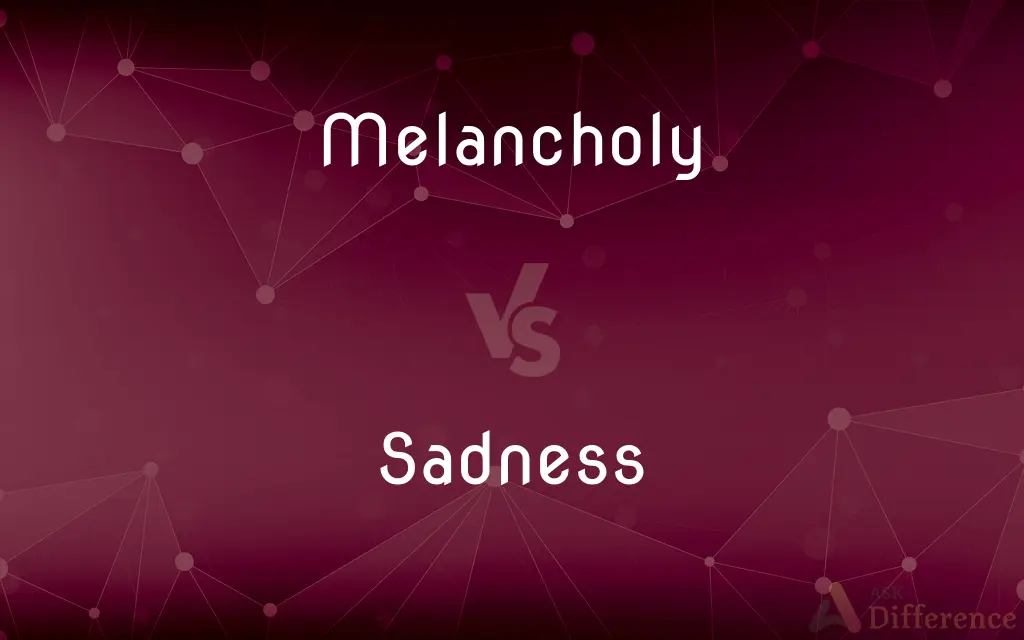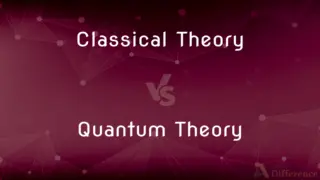Melancholy vs. Sadness — What's the Difference?
By Tayyaba Rehman — Published on November 18, 2023
Melancholy is a deep, prolonged feeling of reflective sadness, while Sadness is a temporary emotional state of sorrow.

Difference Between Melancholy and Sadness
Table of Contents
ADVERTISEMENT
Key Differences
Melancholy, as a noun, describes a deep and enduring emotional state often characterized by reflective or pensive sadness. This state, unlike mere fleeting emotions, can sometimes persist over a longer duration and can be tinged with nostalgia. Sadness, on the other hand, generally refers to a transient emotion experienced due to specific events or circumstances.
Melancholy can often encompass a broader range of emotions than sadness and can sometimes even contain a hint of pleasure in its introspection. However, sadness is a direct and clear response to disappointment, loss, or hurt.
While melancholy might be felt without any apparent reason or trigger, sadness usually emerges as a direct consequence of a specific event.
Comparison Chart
Nature
Prolonged and reflective
Temporary and direct
Duration
Can be enduring
Often transient
ADVERTISEMENT
Cause
May not have a specific cause
Usually a response to an event
Depth
Deeper, often philosophical
Can be surface-level
Association
Sometimes associated with nostalgia
Direct response to disappointment/hurt
Compare with Definitions
Melancholy
A disposition inclined towards somber contemplation.
His writings always carried an air of melancholy, speaking of past times.
Sadness
An emotional response to disappointment, loss, or hurt.
The news of her pet's passing filled her with immense sadness.
Melancholy
A profound sense of sorrow often without a specific cause.
There's a certain melancholy in the evening's quiet stillness.
Sadness
A feeling of dejection stemming from a specific event.
His sadness was evident after hearing the unfavorable decision.
Melancholy
An enduring emotion tinged with nostalgia or introspection.
The autumn season always brings a sense of melancholy, thinking of times gone by.
Sadness
An emotional pain associated with a lack of joy or stimulation.
The gloomy weather often brings a bout of sadness with it.
Melancholy
A feeling of pensive sadness, often without an obvious cause.
Watching the rain from his window, he felt a wave of melancholy wash over him.
Sadness
A heavy-hearted emotion in reaction to adversity.
The community shared their sadness over the loss of the historical monument.
Melancholy
Sadness or depression of the spirits; gloom.
Sadness
Showing, expressing, or feeling sorrow or unhappiness
A sad face.
Melancholy
Pensive reflection or contemplation.
Sadness
Causing sorrow or gloom; depressing
A sad movie.
Sad news.
Melancholy
Black bile.
Sadness
Deplorable or inadequate; sorry
A sad state of affairs.
A sad excuse.
Melancholy
An emotional state characterized by sullenness and outbreaks of violent anger, believed to arise from an excess of black bile.
Sadness
Dark-hued; somber.
Melancholy
Feeling, showing, or expressing depression of the spirits; sad or dejected.
Sadness
(uncountable) The state or emotion of being sad.
Melancholy
Causing or tending to cause sadness or gloom
A letter with some melancholy news.
Sadness
(countable) An event in one's life that causes sadness.
She has experienced many sadnesses in her forty years.
Melancholy
Pensive; thoughtful.
Sadness
Heaviness; firmness.
Melancholy
(historical) Black bile, formerly thought to be one of the four "cardinal humours" of animal bodies.
Sadness
Seriousness; gravity; discretion.
Her sadness and her benignity.
Melancholy
Great sadness or depression, especially of a thoughtful or introspective nature.
Sadness
Quality of being sad, or unhappy; gloominess; sorrowfulness; dejection.
Dim sadness did not spareThat time celestial visages.
Melancholy
(literary) Affected with great sadness or depression.
Melancholy people don't talk much.
Sadness
Emotions experienced when not in a state of well-being
Melancholy
Depression of spirits; a gloomy state continuing a considerable time; deep dejection; gloominess.
Sadness
The state of being sad;
She tired of his perpetual sadness
Melancholy
Great and continued depression of spirits, amounting to mental unsoundness; melancholia.
Sadness
A transient state of sorrow or unhappiness.
The movie's tragic ending left a lingering sadness in the audience.
Melancholy
Pensive maditation; serious thoughtfulness.
Melancholy
Ill nature.
Melancholy
Depressed in spirits; dejected; gloomy dismal.
Melancholy
Producing great evil and grief; causing dejection; calamitous; afflictive; as, a melancholy event.
Melancholy
Somewhat deranged in mind; having the jugment impaired.
Melancholy
Favorable to meditation; somber.
A pretty, melancholy seat, well wooded and watered.
Melancholy
A feeling of thoughtful sadness
Melancholy
A constitutional tendency to be gloomy and depressed
Melancholy
A humor that was once believed to be secreted by the kidneys or spleen and to cause sadness and melancholy
Melancholy
Characterized by or causing or expressing sadness;
Growing more melancholy every hour
Her melancholic smile
We acquainted him with the melancholy truth
Melancholy
A deep, lasting feeling of reflective sadness.
Her song was filled with a haunting melancholy that touched everyone's heart.
Common Curiosities
What is the primary difference between melancholy and sadness?
Melancholy is a deep, prolonged feeling of reflective sadness, while Sadness is a temporary emotional state of sorrow.
Which lasts longer, melancholy or sadness?
Melancholy is often more enduring, while sadness can be more transient.
Can certain environments or seasons induce melancholy more than sadness?
Yes, environments or seasons that evoke nostalgia or introspection might induce melancholy more than direct sadness.
Can melancholy be caused by specific events like sadness?
While sadness usually arises from specific events, melancholy can be felt without an apparent reason.
Is sadness always caused by external factors?
While often triggered by external events, internal reflections and thoughts can also cause sadness.
Is melancholy always negative?
No, melancholy can sometimes be tinged with nostalgia or introspection that isn't entirely negative.
Is melancholy a form of depression?
While both can involve feelings of sadness, melancholy isn't clinically the same as depression.
Can prolonged feelings of sadness lead to melancholy?
It's possible for prolonged sadness to transition into a deeper state that resembles melancholy.
Do all cultures perceive melancholy and sadness in the same way?
Cultural perceptions of emotions can vary, and so the understanding and experience of melancholy and sadness might differ across cultures.
Can one feel both melancholy and sadness at the same time?
Yes, it's possible to experience both, with melancholy being the deeper underlying sentiment and sadness being a more immediate response.
Which is more intense, melancholy or sadness?
It's subjective, but melancholy is usually deeper and more reflective, while sadness can be more immediate and intense.
How can one cope with feelings of melancholy or sadness?
Seeking support, engaging in self-reflection, art, or therapy, and avoiding isolation can help in coping.
Can music or art evoke melancholy and sadness?
Absolutely, many pieces of art and music are designed to evoke a range of emotions, including melancholy and sadness.
Is it possible to turn feelings of melancholy or sadness into creativity?
Yes, many artists, writers, and musicians channel their feelings into their creative work.
Are there any health benefits to feeling sadness or melancholy?
Both emotions can provide opportunities for introspection, growth, and emotional release.
Share Your Discovery

Previous Comparison
Classical Theory vs. Quantum Theory
Next Comparison
Rice Bran Oil vs. Olive OilAuthor Spotlight
Written by
Tayyaba RehmanTayyaba Rehman is a distinguished writer, currently serving as a primary contributor to askdifference.com. As a researcher in semantics and etymology, Tayyaba's passion for the complexity of languages and their distinctions has found a perfect home on the platform. Tayyaba delves into the intricacies of language, distinguishing between commonly confused words and phrases, thereby providing clarity for readers worldwide.
















































